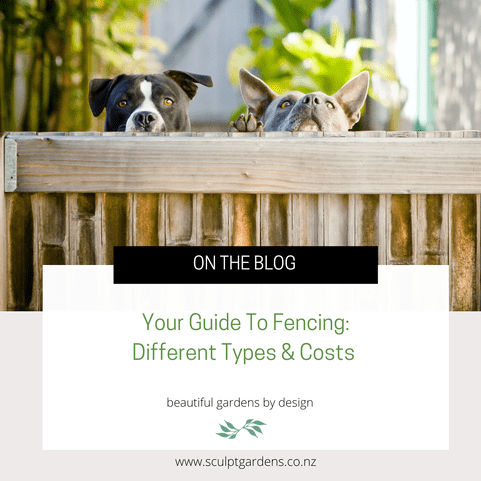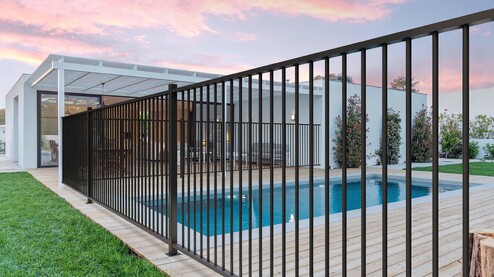When choosing a fence for your backyard, there are many options to consider, which we know can be overwhelming.
This guide covers some of the most popular types of fences used in the North Shore of Auckland and elsewhere, what they are used for and how much you could expect to pay.
If you are going to have your fence professionally installed, consider external costs such as access to the area; whether it is sloped, the ground quality and whether anything needs to be removed.
Wood Fences:
Wood fencing is one of the most sought-after types of fencing due to the low cost and various styles that are available. They can be attractive features in a landscape, whilst also creating privacy.
There are many different types of wooden fences to choose from. Have a drive around your neighbourhood and see what you like, or ask your landscaper what style would suit your home. However, it's important to note that different styles of wooden fences endure different costs - some being much more expensive than others.
Advantages:
They are low cost, you can build them yourself and save money on labour, and if cared for they are durable.
Disadvantages:
Wooden fences need maintaining by water blasting, staining or re-painting every two to three years to prevent the wood from rotting, water damage, warping and getting pests.
Cost:
A basic wooden fence made from low-grade radiata pine is one of the cheapest options if you are on a budget. You can expect to pay around $100 per lineal metre for your fence (an average section being about 60 lineal metres). You will also need to consider the cost of staining or painting your fence unless left to weather. Premium hardwoods can cost as much as $1000 per lineal meter.
Vinyl Fences
Vinyl is a great option if you are needing privacy, attractiveness, security or pool fencing.
Advantages:
Vinyl fences are heavy-duty, long-lasting and can come with a lifetime warranty. Vinyl is more expensive than some other fencing alternatives, however often you do not have to hire a labourer as it comes in easy-to-install panels. It is also low maintenance, easy to paint and quick to wash with water and soap.
Disadvantages:
Can be expensive.
Image sourced from Active Yards
Picket Fence
A picket fence is a stunning option if you are seeking an attractive addition to your landscape. They are ideal for front yards and curb appeal. Whilst traditionally being known to complement cottage-style housing, picket fences are now used frequently and can even match modern-style housing with a contemporary look.
Wooden picket fencing can be an expensive option. For cheaper alternatives, consider using PVC or vinyl.
PVC Advantages:
Sometimes PVC includes wood to make it stronger and withstand extreme weather conditions.
Vinyl Advantages:
They are easy to paint, and easy to maintain but can be more expensive than PVC to install.
Cost:
For PVC picket fencing, you can expect to pay between $50 to $65 per meter. For unpainted wooden picket fencing, pricing begins at $180 per meter, depending on the size and type of wood you use.
Image sourced from Matthews Australasia
Glass Fencing
Frameless glass fencing is a great solution for enclosing a pool. Glass fencing creates a safe area whilst also being an attractive solution that still allows you to enjoy the surrounding landscape.
Disadvantages:
Glass fencing can be more expensive than other fencing alternatives.
Cost:
For frameless glass fencing, you can be expecting to pay around $1,150 per square meter. Cheaper options include framed glass, which starts at around $630 per square meter, and $885 per square meter for semi-framed fencing.
Image sourced from Glass Vice
Composite Fencing
Composite fencing appears and feels similar to a wooden fence, but it is made from materials like recycled plastics and wood fibres.
Advantages:
Composite fences do not need to be painted or stained. They are durable, long-lasting and low-maintenance. They can last over 20 years and are not susceptible to rot or mould. They are one of the most popular fence choices.
Cost:
For a composite fence panel, you can expect to pay around $40 per square meter.
Image sourced from Protector Aluminium
Stone Wall or Pillars
New Zealand has a range of natural stones that can create stunning fences. If you have stone in the exterior of your home, or your existing landscape, consider complimenting the look with a stone wall. Dry stone walls are also an option, which does not require the stones to be set with cement. This can be expensive as you will need to use landscapers.
Cost:
Excluding installation, 150mm of Oamaru stone costs around $70, whilst Hinuera stone begins at $90 per meter. There are other alternatives to these stones too.
Image sourced from Wanaka Stone
Aluminium Fences
Aluminium fences are available in various colours and styles and are good for providing security.
Advantages:
Aluminium doesn't rust, which makes it a suitable low-maintenance option.
Disadvantages:
Aluminium can be damaged in extreme weather.
Cost:
Aluminium fence panels begin at $300 per meter installed.
Image sourced from durafence
Stacked Block Wall
Stacked block walls are becoming a popular modern-day option for creating a property boundary. Block honing, also called polished concrete blocks, is used for an aesthetic look, as the honing reveals the small stones in the concrete. The blocks are sealed to make them waterproof.
GB Masonry Honed Blocks are one of the attractive options for block wall stacking. These can be purchased at stores such as Placemakers and The Brickery. There are many different options to explore, ranging from Splitface Blockwork, to Honed Half High Blockwork.
Advantages:
Concrete block honing is cheaper than plastering and painting. It also is appealing and attractive to the eye. GB Masonry Honed Blocks are suitable for coastal environments, easy to install, pre-finished, rot resistant, suitable under UV exposure, non-combustible, and environmentally sustainable. As well as this they are strong, impact resistant, and sound insulating.
Designed by Sculpt Gardens
Offset Block Wall
An offset block wall is the same as a stacked block wall, except the design and appearance of the concrete blocks differ.
Blocks are laid in a unique way that gives an aesthetic appeal.
Cost:
The cost for a block wall differ depending on what materials you choose, the design and the installation costs. If you were considering installing a block wall yourself, this PDF contains a guide with useful how-to information.
Designed by Sculpt Gardens
Hopefully, you will now have gained an understanding of some different fences available and an idea of what they may cost you.
If you would love some assistance with your landscape design, please do not hesitate to get in touch here!





















